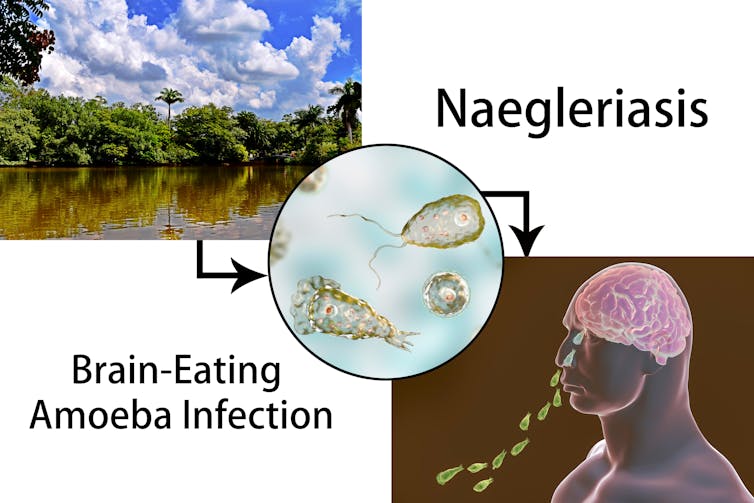There s a brain eating amoeba that lives in lakes and rivers of the southern united states

There’s a Brain-Eating Amoeba that Lives in Lakes and Rivers of the Southern United States

In the warm freshwater lakes and rivers of the southern United States, there lurks a microscopic organism with a deadly reputation. Meet Naegleria fowleri, a brain-eating amoeba that has become the subject of public concern and interest. This amoeba can cause a rare but devastating infection called primary amebic meningoencephalitis (PAM). While the infection is rare, it is essential to be aware of the risks and take precautionary measures to stay safe when enjoying recreational activities in freshwater.
Naegleria fowleri is typically found in warm freshwater environments, including rivers, hot springs, and poorly maintained or untreated swimming pools. It thrives in temperatures above 80°F (26°C) and becomes more abundant in the summer months when water temperatures are at their peak. The southern United States, with its warm climate, serves as an ideal habitat for this amoeba.

When an individual comes into contact with water contaminated by Naegleria fowleri, there is a potential risk of infection. A person becomes infected when water containing the amoeba enters their nasal passages. The amoeba then travels through the olfactory nerve, reaching the brain and causing inflammation and destruction of brain tissue. It is important to note that the amoeba does not cause harm if consumed orally.
The symptoms of PAM, the infection caused by Naegleria fowleri, are similar to those of bacterial meningitis. Initially, individuals may experience fever, headache, nausea, and vomiting. As the infection progresses, stiff neck, loss of balance, seizures, hallucinations, and altered mental state can occur. PAM progresses rapidly, often leading to coma and death within a week.
Fortunately, the infection is very rare, with an average of only three cases reported in the United States each year. Despite its rarity, it is crucial to take necessary precautions to protect oneself from exposure to Naegleria fowleri. Here are some safety tips to consider:
Nasal Protection: When participating in water-related activities in warm freshwater, consider wearing nose clips or keeping your head above water to prevent water from entering your nasal passages.
Avoid Stirring up Sediments: Activities such as diving, jumping, or aggressively splashing in warm freshwater lakes or rivers can stir up the sediments and potentially increase the likelihood of exposure to the amoeba. Encourage calm water-related activities to reduce the risk.
Choose Safe Water Sources: Opt for properly monitored and maintained swimming pools or adequately treated community water systems. These are less likely to harbor the amoeba compared to untreated freshwater environments.
Proper Water Sanitization: If you own a private swimming pool or hot tub, ensure proper disinfection and filtration to reduce the chances of amoeba contamination. Follow recommended water treatment guidelines.
It is essential to remain informed about the risks associated with Naegleria fowleri while not succumbing to unnecessary fear. By following these precautions and staying vigilant when participating in recreational activities, individuals can continue to enjoy the beauty of warm freshwater lakes and rivers while minimizing the risk of infection.
Source: CBS News
Share
Related Posts
Quick Links
Legal Stuff

